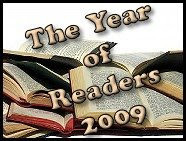So here it is, October, I'm recovered from my illness, and completed enough of the things that were taking up time in my life that I can once again blog regularly.
I was reading the travails of Joe, the new literary publicity guy at Penguin.co.uk, and feeling a great deal of sympathy. Under the fully appropriate title, "How does everyone here read so quickly?" he writes of his struggles to keep up with how well read everyone at Penguin is.
It often feels like a Sisyphean task, trying to be well read. It sounds that way for Joe, and it certainly seems that way for me. It's not quite like Sisyphus of course, he would reach the top of his mountain, and the boulder would roll right down to the bottom again for him to push it back up. My boulder only goes up, but the top of the mountain is climbing a lot faster than I am.
I type about as quickly as if I were simply speaking quickly, and I read a bit faster than that, but I'm not the fastest reader out there. I am diligent, but not in that I sit down for three hours and push my way through a single book. That happens, but when it does, it's a matter of the book, more than of me. Some books will pull me through them so fast that I have to force myself to read every paragraph, others, that I like just as much, I read so slowly it's like I'm crawling physically across the page. One of the reasons that I read more than one book at a time is to capitalize on momentum. At different times I have different moods as a reader, and different books suck me in.
For example, for the past few weeks, I have been reading The Era of Franklin D. Roosevelt by Richard D. Polenberg, a really wonderful examination of F.D.R's presidency, largely through the lens of contemporary documents, at the same time though, I've read and completed about ten other books. Some of these books I've read in just one or two sittings (for example, I've already mentioned my terrible Nero Wolfe habit), and others have been read in and around those, like James Hamilton-Paterson's excellent Cooking with Fernet Branca from Europa Editions. Reading like this can be a bit chaotic I suppose, but it works for me.
Still, no matter how often I set specific goals, saying, "oh, when I read X, I will have climbed a step higher in being well-read" I get there, and it seems I've hardly moved, or worse, I've moved backwards.
There are a couple of directions I'm always trying to move in from the most focused, there is movement within an author's work, when I was young, if I liked an author, I read everything of theirs that I could get my hands on. Now, as I've gotten older, this happens less often, still, if I really like an author, I try to make it a point to read more than one of their books, and work my way to a complete set later.
The second direction is the list of authors of whom I've heard, but haven't read. I have a list as long as my arm of authors like that, and I try to find at least one of their books to read. Sometimes this moves them into the above mentioned category, sometimes not. Right now for example I'm also reading The Presidential Papers of Norman Mailer (Is there a theme in my current reading? maybe a little...), I may decide that this meets the initial criteria of having read some Mailer, I might not though, as it seems to be out of print and lesser known.
The third direction is the most vague, being for larger categories in which I would like to have read. This includes my desire to read one book by an author of each country out there. Almost certainly an impossible task, but a worthy direction. There is also my desire to read works of different periods or stylistic movements, modern, post-modern, Victorian, etc. Many of these categories expand the more I learn. As a tangent to reading from different countries in general, I also want to read more contemporary international fiction. (nota bene: I came to this desire before the permanent secretary of the Nobel Prize for Literature went off on his high horse.) I've been helped in this goal by the discovery of Europa Editions, who make it their goal to provide good English translations of contemporary European fiction.
It's so commonly discussed, that the observation is almost trite, but I strongly agree with the statement that the more one knows, the more one knows that one doesn't know. It's been said a million times, in many different ways, and it's still true. Every time I learn something knew, it opens up new realms of things that I should know, and I really enjoy that. I don't think ignorance is half as blissful as the opening up of new realms for discovery.
Wednesday, October 8, 2008
Reading Sisyphus
Subscribe to:
Post Comments (Atom)

No comments:
Post a Comment